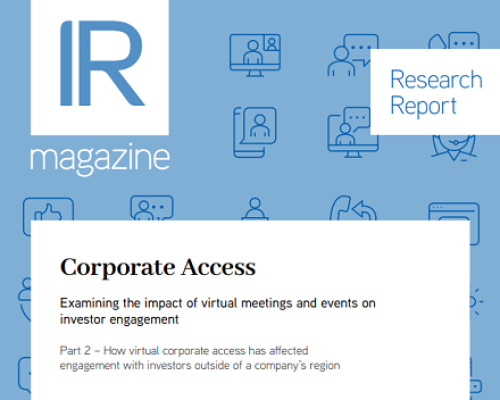Frontier market exchange is expecting seven more listings in 2011 but has a huge ‘image deficit’, says PEX CEO
When Ahmad Aweidah and his delegation of leading Palestinian companies visited the City this spring, many of the fund managers they met hadn’t known, until recently, that Palestine had a stock exchange.
‘We are starting from a very low baseline,’ says Aweidah, who took the helm as CEO of the Palestine Exchange (PEX) in June 2008. ‘We are basically beginning at the point where people don’t even know we exist.’
Indeed, as communication challenges go, Aweidah’s is exceptional. ‘Palestine has a huge image deficit,’ he observes. ‘We get perhaps more media coverage than any part of the world but, unfortunately, it’s the wrong kind of coverage.’
The three-day investor roadshow in London was a key element in the PEX’s drive to change the international investment community’s perception of Palestine and showcase its 40 West Bank and Gaza Strip listings. ‘For those willing to look beyond the headlines, the PEX offers a great value proposition,’ says Aweidah, who’s brought delegations to Chile (home to the largest overseas Palestinian community) and the UAE, and who plans to make the London trip an annual event.
While targeting traditional institutional investors and frontier funds, Aweidah points out that ‘the wealthy Palestinian diaspora [of about 7 mn] is a natural audience for the PEX and a very important part of our work’.
If a recent IPO’s results are anything to go by, the development of a robust retail culture is not an issue. In the biggest deal in 10 years, mobile telecom company Wataniya Mobile raised $80 mn, while managing in a two-week offering period to attract almost 14,000 individual investors. Besides adding thousands of new investors, Aweidah says the listing, set to begin trading on January 6, will add about 15 percent to the PEX’s total capitalization, pushing it well beyond $2.5 bn.
In 2011 Aweidah expects seven more listings, including the PEX itself. Earlier this year, in preparation for its listing, the PEX transformed itself into a public company, launched a new corporate identity and began the search for a strategic partner to help develop trading technology. ‘We are the only exchange in the Arab world that is private-sector owned,’ says Aweidah. ‘The state has no stake in the PEX.’
Aweidah points out that the exchange seeks a specific kind of partner. ‘We aren’t looking for partners because we need money,’ he explains. ‘We want partners who can bring technical know-how or new business.’
In the meantime, Aweidah is determined to raise IR awareness among Palestinian companies. In November the exchange hosted its fourth annual capital markets forum. Themed ‘Investor relations: an effective practice to mitigate crisis’, the Ramallah event featured IR pros from the UK, the US and the Middle East.
‘IR in Palestine is still in its elementary stages,’ says Aweidah. ‘We are working with companies and encouraging them to set up a specific IR function to respond to institutional investors’ needs and expectations.’ So far, six companies representing some 80 percent of total market capitalization have dedicated IR teams, he adds.
In 2011 the exchange is bringing in a UK financial communications outfit to provide additional training. ‘We are working hard with our top candidates on lifting our game to international standards,’ says Aweidah. ‘Ultimately this will increase foreign investment on the exchange.’
Indeed, about 47 percent of Palestinian stocks are already owned by non-Palestinians. ‘Palestine has the freest foreign exchange and ownership regime anywhere in the Middle East,’ notes Aweidah. ‘There are absolutely no restrictions in that regard. And we definitely do not discriminate against investors based on nationality. Even Israelis can invest, although they do not.’
Too bad. Despite privation and civil unrest, between 1997 and 2010 the PEX has seen a 17.5 percent average annual return. Selling the Palestinian brand isn’t easy, admits Aweidah. But despite the political turmoil, it seems the PEX can be a very profitable investment site.










